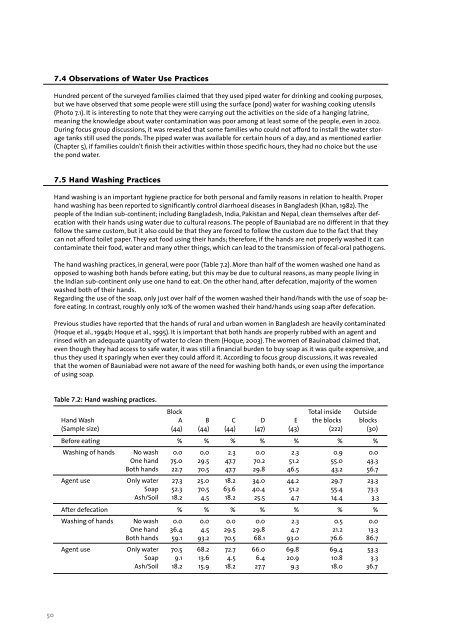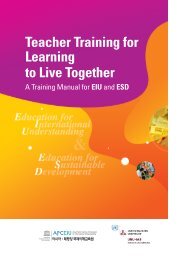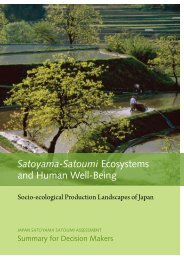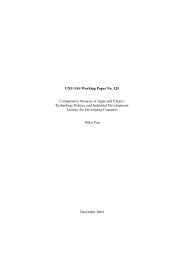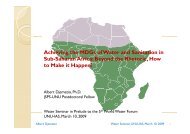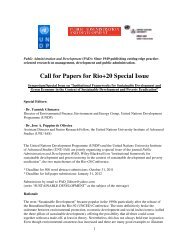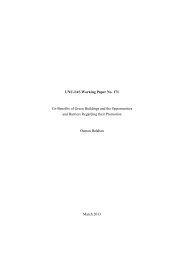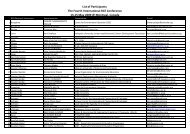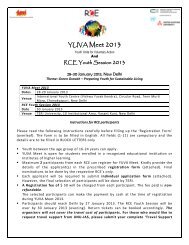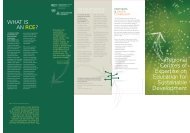Untitled - UNU-IAS - United Nations University
Untitled - UNU-IAS - United Nations University
Untitled - UNU-IAS - United Nations University
Create successful ePaper yourself
Turn your PDF publications into a flip-book with our unique Google optimized e-Paper software.
7.4 Observations of Water Use Practices<br />
<br />
<br />
Hundred <br />
percent of the surveyed families claimed that they used piped water for drinking and cooking purposes,<br />
but <br />
we have observed that some people were still using the surface (pond) water for washing cooking utensils<br />
(Photo <br />
7.1). It is interesting to note that they were carrying out the activities on the side of a hanging latrine,<br />
meaning the knowledge about water contamination was poor among at least some of the people, even in 2002.<br />
During focus group discussions, it was revealed that some families who could not afford to install the water storage<br />
tanks still used the ponds. The piped water was available for certain hours of a day, and as mentioned earlier<br />
(Chapter 5), if families couldn’t finish their activities within those specific hours, they had no choice but the use<br />
the pond water.<br />
<br />
<br />
7.5 Hand Washing Practices <br />
<br />
Hand washing is an important hygiene practice for both personal and family reasons in relation to health. Proper <br />
hand washing has been reported to significantly control diarrhoeal diseases in Bangladesh (Khan, 1982). The <br />
people of the Indian sub-continent; including Bangladesh, India, Pakistan and Nepal, clean themselves after defecation<br />
with their hands using water due to cultural reasons. The people of Bauniabad are no different in that they<br />
<br />
follow the same custom, but it also could be that they are forced to follow the custom due to the fact that they<br />
can not afford toilet paper. They eat food using their hands; therefore, if the hands are not properly washed it can<br />
contaminate their food, water and many other things, which can lead to the transmission of fecal-oral pathogens.<br />
<br />
<br />
<br />
<br />
The hand washing practices, in general, were poor (Table 7.2). More than half of the women washed one hand as<br />
opposed to washing both hands before eating, but this may be due to cultural reasons, as many people living in<br />
<br />
the Indian sub-continent only use one hand to eat. On the other hand, after defecation, majority of the women<br />
<br />
washed both of their hands.<br />
<br />
<br />
Regarding the use of the soap, only just over half of the women <br />
<br />
washed their hand/hands with the use of soap be-<br />
fore eating. In contrast, roughly only 10% of the women washed their hand/hands using soap after defecation.<br />
<br />
<br />
Previous<br />
<br />
studies have reported that the<br />
<br />
hands of rural and urban<br />
<br />
women in Bangladesh are heavily contaminated<br />
(Hoque<br />
<br />
et al., 1994b; Hoque et al., 1995).<br />
<br />
It is important that<br />
<br />
both hands<br />
<br />
are properly<br />
<br />
rubbed with an agent and<br />
<br />
rinsed with an adequate quantity of water to clean them (Hoque, 2003). The women of Bauinabad claimed that,<br />
<br />
even though they had access to safe water, it was still a financial burden to buy soap as it was quite expensive, and<br />
thus <br />
they used it sparingly when ever they could afford it. According to focus group discussions, it was revealed<br />
that <br />
the women of Bauniabad were not aware of the need for washing both hands, or even using the importance<br />
of using <br />
soap.<br />
Table 7.2: Hand washing practices.<br />
<br />
<br />
<br />
<br />
<br />
<br />
<br />
<br />
<br />
<br />
<br />
<br />
<br />
<br />
<br />
<br />
<br />
<br />
<br />
<br />
<br />
<br />
<br />
<br />
<br />
50


